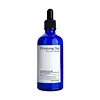What's inside
What's inside
 Key Ingredients
Key Ingredients

No key ingredients
 Benefits
Benefits

 Concerns
Concerns

 Ingredients Side-by-side
Ingredients Side-by-side

Coptis Japonica Extract
AntimicrobialButylene Glycol
HumectantOlea Europaea Fruit Oil
MaskingCaprylic/Capric Triglyceride
Masking1,2-Hexanediol
Skin ConditioningStearic Acid
CleansingPolysorbate 60
EmulsifyingCetearyl Alcohol
EmollientGlyceryl Stearate
EmollientSorbitan Sesquioleate
EmulsifyingGlyceryl Caprylate
EmollientHydroxyethylcellulose
Emulsion StabilisingCarbomer
Emulsion StabilisingArginine
MaskingDimethicone
EmollientWater
Skin ConditioningButylene Glycol
HumectantGlycerin
HumectantGlycereth-26
HumectantCaprylic/Capric Triglyceride
Masking1,2-Hexanediol
Skin ConditioningPentaerythrityl Tetraisostearate
EmollientPanthenol
Skin ConditioningPantolactone
HumectantCeramide EOP
Skin ConditioningCeramide Ns
Skin ConditioningCeramide NP
Skin ConditioningCeramide As
Skin ConditioningCeramide AP
Skin ConditioningBiosaccharide Gum-1
HumectantHeptasodium Hexacarboxymethyl Dipeptide-12
Skin ConditioningPhytosphingosine
Skin ConditioningC14-22 Alcohols
Emulsion StabilisingCetearyl Alcohol
EmollientStearic Acid
CleansingSorbitan Sesquioleate
EmulsifyingGlyceryl Stearate
EmollientHydrogenated Lecithin
EmulsifyingCarbomer
Emulsion StabilisingGlucose
HumectantC12-20 Alkyl Glucoside
EmulsifyingEthylhexylglycerin
Skin ConditioningCholesterol
EmollientTromethamine
BufferingWater, Butylene Glycol, Glycerin, Glycereth-26, Caprylic/Capric Triglyceride, 1,2-Hexanediol, Pentaerythrityl Tetraisostearate, Panthenol, Pantolactone, Ceramide EOP, Ceramide Ns, Ceramide NP, Ceramide As, Ceramide AP, Biosaccharide Gum-1, Heptasodium Hexacarboxymethyl Dipeptide-12, Phytosphingosine, C14-22 Alcohols, Cetearyl Alcohol, Stearic Acid, Sorbitan Sesquioleate, Glyceryl Stearate, Hydrogenated Lecithin, Carbomer, Glucose, C12-20 Alkyl Glucoside, Ethylhexylglycerin, Cholesterol, Tromethamine
 Reviews
Reviews

Ingredients Explained
These ingredients are found in both products.
Ingredients higher up in an ingredient list are typically present in a larger amount.
1,2-Hexanediol is a synthetic liquid and another multi-functional powerhouse.
It is a:
- Humectant, drawing moisture into the skin
- Emollient, helping to soften skin
- Solvent, dispersing and stabilizing formulas
- Preservative booster, enhancing the antimicrobial activity of other preservatives
Butylene Glycol (or BG) is used within cosmetic products for a few different reasons:
Overall, Butylene Glycol is a safe and well-rounded ingredient that works well with other ingredients.
Though this ingredient works well with most skin types, some people with sensitive skin may experience a reaction such as allergic rashes, closed comedones, or itchiness.
Learn more about Butylene GlycolThis ingredient is an emollient, solvent, and texture enhancer. It is considered a skin-softener by helping the skin prevent moisture loss.
It helps thicken a product's formula and makes it easier to spread by dissolving clumping compounds.
Caprylic Triglyceride is made by combining glycerin with coconut oil, forming a clear liquid.
While there is an assumption Caprylic Triglyceride can clog pores due to it being derived from coconut oil, there is no research supporting this.
Learn more about Caprylic/Capric TriglycerideCarbomer is a polymer of acrylic acid. Its main role is to create a gel consistency.
A high amount of carbomer can cause pilling or balling up of products. Don't worry, most products contain 1% or less of carbomer.
Cetearyl alcohol is a mixture of two fatty alcohols: cetyl alcohol and stearyl alcohol. It is mainly used as an emulsifier. Emulsifiers help prevent the separation of oils and products. Due to its composition, it can also be used to thicken a product or help create foam.
Cetearyl alcohol is an emollient. Emollients help soothe and hydrate the skin by trapping moisture.
Studies show Cetearyl alcohol is non-toxic and non-irritating. The FDA allows products labeled "alcohol-free" to have fatty alcohols.
This ingredient is usually derived from plant oils such as palm, vegetable, or coconut oils. There is debate on whether this ingredient will cause acne.
Due to the fatty acid base, this ingredient may not be Malassezia folliculitis safe.
Learn more about Cetearyl AlcoholGlyceryl Stearate is a mix of glycerin and stearic acid.
It is used to stabilize the mixing of water and oil ingredients. By preventing these ingredients from separating, it can help elongate shelf life. It can also help thicken the product's texture.
As an emollient, it helps soften skin and supports barrier-replenishing ingredients.
In cosmetics, Glyceryl Stearate is often made from vegetable oils or synthetically produced.
This ingredient may not be fungal-acne safe
Fun fact: The human body also creates Glyceryl Stearate naturally.
Learn more about Glyceryl StearateSorbitan Sesquioleate is derived from sorbitol and oleic acid. It is an emulsifier and prevents ingredients from separating.
Specifically, this ingredient is a water-in-oil emulsifier, meaning it helps water dissolve into oil.
Some studies suggest this ingredient may cause irritation in some people. If you are unsure, it is best to patch test.
This ingredient may not be Malassezia folliculitis, or fungal-acne safe.
Learn more about Sorbitan SesquioleateStearic Acid is a fatty acid. It is an emollient, emulsifier, and texture enhancer.
As an emollient, stearic acid helps soften skin. It aids the skin's protective barrier by preventing water loss. It also provides a gentle cleansing effect without stripping away natural oils.
Stearic acid may also be used to enhance the texture of products. It can add volume and stabilize ingredients such as water and oil. This can help water and oil ingredients from separating.
Sources of stearic acid include animal or vegetable fats/oils such as coconut or shea. It can be naturally found in butter, cocoa butter, shea butter, vegetable fats, and animal tallow.
This ingredient may not be Malassezia folliculitis, or fungal-acne safe.
Learn more about Stearic Acid